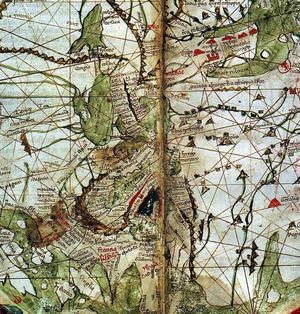Italian Studies: Italian Research Seminar—Roberta Morosini (Wake Forest)

Reading the Medieval Mediterranean: Navigation, Maps, and Literary Geographies. Questions, Approaches, and Methods.
Following the publication of Il mare salato. Il Mediterraneo di Dante, Petrarca e Boccaccio (Viella 2019), Morosini will share her study of the Mediterranean in geocritical terms. The seminar will focus on the representation of the Mediterranean and its “liti,” its discordant or opposing shores, as literary spaces in the works of Dante, Petrarch, and Boccaccio. With the rising interest in Mediterranean studies as a discipline, the goal is to raise questions among students of literature about “reading” the sea in a literary text. How do we read the sea? Do we have the epistemological tools to do so? What does the sea tell us about the world the writers were living in and about their poetics? In doing so, the aim is to share the questions asked, the epistemological tools and the cultural categories used, and the approach adopted each time in Morosini’s attempts to read the sea in Dante, Petrarch, and Boccaccio. Finally, references to Cristoforo Buondelmonti’s navigation to the Greek islands at the beginning of the fourteenth century contribute to showing how the invention of nautical maps inspired writers like Dante, Petrarch, Boccaccio, and Fazio degli Uberti to use the motif of navigation through the Mediterranean Sea as a way to define the periphery/ies and center/s of Italy. Buondelmonti, in fact, moves away from literary and/or metaphorical navigation, and in particular from Boccaccio’s Genealogy, in which the author would imagine traveling to the sites of ancient myth, and he truly embarks and sails to the Aegean Islands.
—
Roberta Morosini is professor of Italian at Wake Forest University. She is the former vice president of the American Boccaccio Association, fellow of the Villa I Tatti Harvard Center of Renaissance Studies in Florence, and the Liguria Study Center in Bogliasco. She is also a 2012 fellow scholar for the NEH Mediterranean Summer Institute, “Networks and Knowledge: Synthesis and Innovation in the Muslim-Christian-Jewish Medieval Mediterranean” and the recipient of the Luigi De Lise Culture Award (2015). Her research is centered around Medieval and Early Modern Italy in and of the Mediterranean. It focuses on issues of storytelling, reception, and modalities of narration with special attention to the relation between text and image and to the representation of spaces where stories and legends unfold. Her recent publications include: Dante, il Profeta e il Libro. La leggenda del toro dalla Commedia a Filippino Lippi, tra sussurri di colomba ed echi di Bisanzio (L’Erma di Bretschneider, 2018) and Il mare salato. Racconti e immagini del mediterraneo… (Viella, 2019).
The Italian Research Seminar, a core event of the Center for Italian Studies, aims to provide a regular forum for faculty, postdoctoral scholars, graduate students, and colleagues from other universities to present and discuss their current research. The Seminar is vigorously interdisciplinary, and embraces all areas of Italian literature, language, and culture, as well as perceptions of Italy, its achievements and its peoples in other national and international cultures. The Seminar constitutes an important element in the effort by Notre Dame’s Center for Italian Studies to promote the study of Italy and to serve as a strategic point of contact for scholarly exchange.

Originally published at italianstudies.nd.edu.